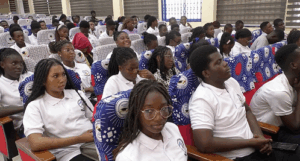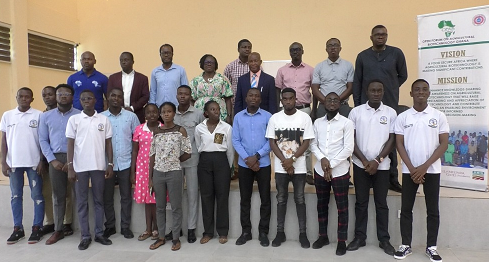By Nana Yaw Reuben Jr.
The Open Forum on Agricultural Biotechnology in Africa a non-governmental organization fostering dialogue on agricultural biotechnology to enhance food security and economic growth across the country has encouraged students to choose courses in relation to biotechnology as a panacea to help achieve food security in our country.
Dean, School of Biological Sciences at the University of Cape Coast (UCC), Prof. Aaron Asare, who made the call, believes that biotechnology is the surest tool to increase food production and sustain farming practices across our region.
According to the Plant Biotechnologist, up-and-coming scientists must embrace the tool to develop improved crop varieties for our smallholder farmers.
Prof. Asare, who is also a senior lecturer at the college of Agriculture and Natural Sciences said this during a Seminar under the theme “OFAB Youth for Biotech Seminar” at the graduate school auditorium University of Cape Coast (UCC) organized by Open Forum on Agricultural Biotechnology in Africa (OFAB), Ghana Chapter an institution hosted by the Council for Scientific and Industrial Research (CSIR).
He explained that the adoption of biotechnology would help to solve some of the major challenges that confront smallholder farmers in Ghana, including low crop yield and excessive use of pesticides, among others.
“Ghana, with its numerous agricultural challenges, has no choice but to embrace biotechnology; it’s time to empower the youth to venture into the Agriculture Biotechnology Revolution happening across the globe.
“Biotechnology has a wide range of applications, including agriculture, medical, and environmental applications, among others. This will help our smallholder farmers not to worry about whether there are erratic rains or not”, he said.
For his part, Dr. Daniel Osei Ofosu, a Research Scientist at the Biotechnology and Nuclear Agriculture Research Institute, urged the students to embrace and accept Genetically Modified Organism (GMO) foods because it’s one of the ways to increase food production in Ghana and across the globe.

Dr. Ofosu, who is also the Country Coordinator, Program for Biosafety Systems, said GM foods are not harmful to human health and the environment, as has been preached by some opponents of the tool.
“Let me mention that previous media coverages on biotechnology in the country were obstructive, and I hope that with more knowledge and understanding gained by our media, they would help dispel the misconception about the technology”, he stated.
Deputy Director, Administration, Teaching and Learning at the West Africa Centre for Crop Improvement (WACCI), Dr. Daniel Dzidzienyo, also opined that Ghana is currently not very hostile to the idea of introducing biotech in our agriculture space, hence the need for our students to embrace and develop career paths in that space.
“Agricultural Biotechnology is gradually being accepted and has vast opportunities, particularly for students; you can become a lecturer or crop consultant, among others. Biotechnology is shaping the future, and the world needs sharp and bold thinkers like you to lead the change,” he added.
Mrs. Mary Ama Kudom-Agyeman, an environmental communicator and media consultant, urged the students to develop an interest in creating social media platforms as channels to preach about the advantages of agricultural biotechnology as a means of disseminating information to the general population.
“This is the reason why OFAB Ghana has taken it upon itself to help build the mindset of a critical mass of people, especially our farmers and the youth, who have an interest in biotech for them to benefit from it fully”, she said.










